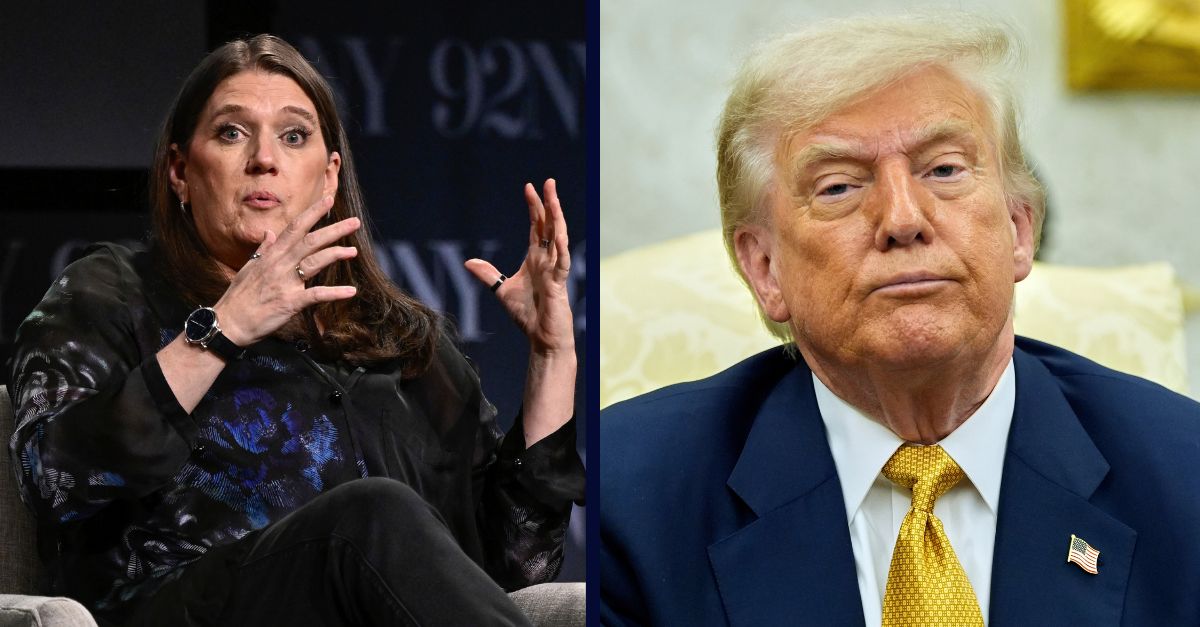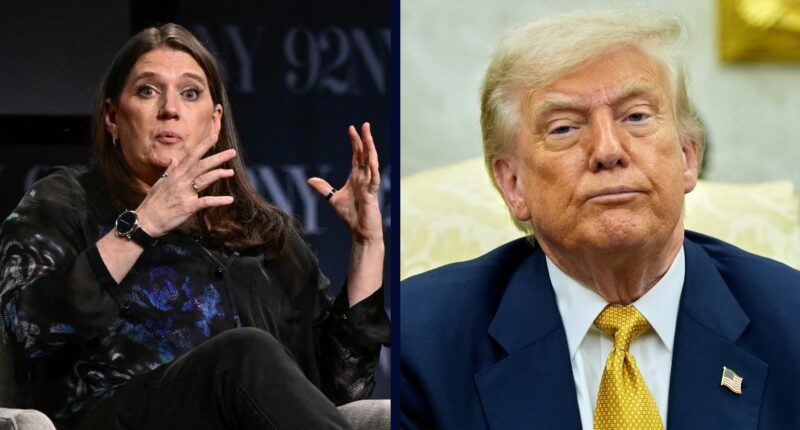
Left: Mary Trump discussing her book “Who Could Ever Love You: A Family Memoir” at The 92nd Street Y on Thursday, Sept. 12, 2024, in New York (Photo by Evan Agostini/Invision/AP). Right: President Donald Trump listens during a meeting with Bahrain”s Crown Prince Salman bin Hamad Al Khalifa in the Oval Office of the White House, Wednesday, July 16, 2025, in Washington (AP Photo/Alex Brandon).
A private lawyer for President Donald Trump scathingly opposed his niece Mary Trump’s request for permission to again pursue discovery that she views as crucial for her defense against her uncle’s civil lawsuit, a case he brought over the exposure of decades-old Trump family financial secrets in the pages of the New York Times.
In the Thursday opposition filing, submitted by attorney Michael Madaio, Donald Trump’s team argued that his niece’s motion “fails on both procedural and substantive grounds and should be denied in its entirety,” just as those arguments were rejected two other times already.
“Defendant simply expresses her discontent with the Court’s decision to deny her demand for discovery, and rehashes the same arguments that she previously raised in support of the underlying motion,” the filing said. “The Court has already rejected Defendant’s position in its well-reasoned Decision and Order dated May 21, 2025, and Defendant should not be permitted to take a ‘second bite’ at the proverbial apple. On this basis alone, Defendant’s motion should be denied.”
Mary Trump contends, on the other hand, that New York Supreme Court Justice Robert R. Reed “overlooked or misapprehended material facts regarding the state of the pleadings, as well as governing law,” when he refused to allow discovery of so-called “Estate Valuation Materials” in May.
The president’s niece apparently believes these documents would help boost her claim that she was fraudulently induced into a 2001 Trump family settlement agreement two years after Fred Trump Sr.’s death, and therefore she should not be sued by her uncle for allegedly breaching a “confidentiality provision” to expose legally “dubious tax schemes” and “outright fraud” in concert with the New York Times reporters.
In September 2021, Donald Trump sued his niece, the New York Times, and Times reporters Susanne Craig, David Barstow, and Russell Buettner, claiming they “maliciously conspir[ed] against him” in an “insidious plot” to obtain and publish his confidential tax records, claiming they were “motivated by a personal vendetta and their desire to gain fame, notoriety, acclaim and a financial windfall and were further intended to advance their political agenda.”
The Times reporting won a Pulitzer Prize in 2019, with the award judges describing the reporters’ work as having “revealed a business empire riddled with tax dodges.”
Donald Trump, at the time represented by Alina Habba, now acting U.S. Attorney for the District of New Jersey, asserted that Times reporters tortiously interfered by wrongly inducing his niece to turn over his tax information, causing “significant damages as a direct result.”
The Times, for its part, called the lawsuit an “attempt to silence independent news organizations” when they report on matters “of overriding public interest,” including tax returns the president long resisted seeing the light of day.
Mary Trump, the daughter of the president’s late brother Fred Trump Jr., argued that the judge has thus far eviscerated a key defense by walling off from discovery “Valuation Materials” on assets in her grandfather Fred Trump’s Sr. estate.
“The Court should grant leave to reargue because it overlooked or misapprehended facts and law in declining to order Plaintiff to produce the Estate Valuation Materials relevant to Defendant’s fraud defense,” said her motion for reargument. “If not corrected, that decision will severely prejudice Defendant, as the practical effect of the Court’s ruling is to deprive her of the opportunity to build a factual record in support of a defense that has not yet been adjudicated on its merits.”
The defendant maintained the discovery is crucial and necessary to defeat her uncle’s claim that the family settlement’s “confidentiality provision” was legally valid, binding, and enforceable.
Love true crime? Sign up for our newsletter, The Law&Crime Docket, to get the latest real-life crime stories delivered right to your inbox
“If Defendant prevails on her fraud defense, as she should, that would undo the confidentiality provision that is the basis for Plaintiff’s breach of contract claim,” her motion continued, before concluding: “But by denying her access to necessary discovery relevant to that defense, the Court has, in effect, improperly decided the merits of that defense prematurely. If not reversed, the Order will prejudice Defendant and frustrate the equitable administration of justice.”
The president countered Thursday that, actually, Reed “correctly found” that Mary Trump “is not entitled to force the production of decades-old documents concerning the value of estate-related interests exchanged in connection with the 2001 Estate Actions.”
In May, Reed was straightforward in ruling that Mary Trump could not rely on arguments that failed in a separate lawsuit she filed against her uncle. In November 2022, Reed threw out Mary L. Trump v. Donald J. Trump, a case where the plaintiff attempted to discover the “true value” of her inheritance.
The judge concluded at the time that documents “clearly and unambiguously released [Trump family] defendants from unknown claims, including fraud claims,” and that Mary Trump was barred from suing.
“If plaintiff did not wish to forego suing on fraud she might discover in the future, she could have insisted that the releases be conditioned on the truth and accuracy of the financial information provided by defendants,” Reed added, tossing the case.
An appeal did not succeed.
When denying defendant Mary Trump’s discovery requests in May, Reed referred to his previous ruling and repeated that he had “rejected” her challenge to the “settlement agreement and release based on fraud.”
“Therefore, as there is no valid contention that the release and settlement agreement in this action is a separate document or somehow different from the release involving both parties in the prior dismissed action, defendant’s request for discovery, premised on the defense of fraud, is rejected,” he wrote.
In closing, Reed said again that Mary Trump was, in his view, barred from raising her arguments based on his adverse ruling tossing her lawsuit.
“[T]o the extent that defendant bases a discovery request upon a legal theory she is arguably estopped from asserting, this court declines to order the production of said information at this time,” he wrote.
Donald Trump’s legal team now says this decision by Reed was “not a legal error,” but rather “a case-specific, discretionary ruling that does not warrant reargument.”
“It was within the Court’s discretion to deny discovery as to a defense premised on a theory Defendant is arguably estopped from asserting,” wrote Madaio. “Moreover, Defendant previously asserted a fraud claim arising from the same Settlement Agreement, which this Court dismissed with prejudice and the Appellate Division affirmed.”
The president urged Reed to see that his niece’s “position” on discovery “is not legally viable” for an additional reason: she’s impermissibly trying to have it both ways by challenging the validity of a contract she benefitted from to the tune of at least $2.7 million.
“It is well settled that a party may not affirm a contract by retaining its benefits while simultaneously seeking to rescind it,” the opposition filing added, dubbing Mary Trump’s motion a fishing expedition. “Whether cast as a claim or a defense, Defendant’s theory amounts to rescission in disguise, and provides an independent basis to deny her discovery request.”
Jerry Lambe contributed to this report.







